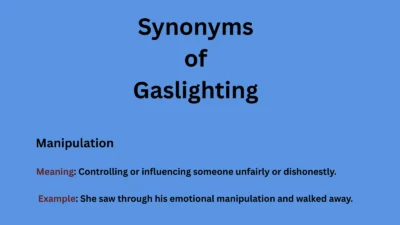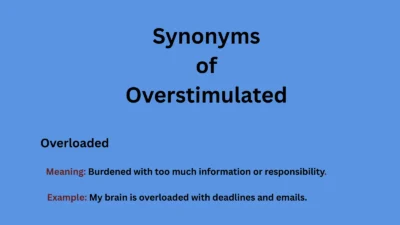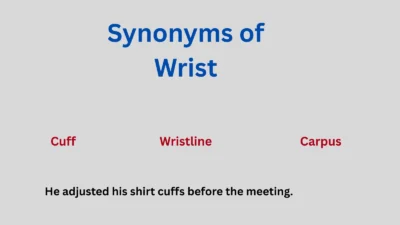Looking for alternative ways to describe a clever contradiction? These insightful synonyms of oxymoron will sharpen your writing and expand your vocabulary. The word oxymoron refers to a figure of speech where two opposite or contradictory terms are paired together, like deafening silence or bittersweet memory. It’s a literary device used to create a dramatic effect, highlight irony, or express complex ideas in just a few words.
But if you find yourself overusing oxymoron or want a variation that suits a different tone or context, this guide is for you. In this article, we’ll explore 20+ thoughtful synonyms of oxymoron, each with definitions, usage tips, and examples. Whether you’re writing creatively, analytically, or conversationally, these alternatives will help you describe contradictions with style and clarity.
🤔 What Is an Oxymoron?
An oxymoron is a figure of speech where two seemingly contradictory words are paired together to create a unique or nuanced meaning. Classic examples include:
- Jumbo shrimp
- Living dead
- Seriously funny
While not a personality trait (like shy or modest), the tone of an oxymoron often carries a subtle, introspective, or ironic flavor. It forces readers to pause and consider the contradiction, which can feel understated or reflective, qualities often described as reserved or nuanced.
Now let’s explore 30 synonyms, related words, and linguistic cousins of “oxymoron” that you can use to describe contradictions, paradoxes, and subtleties in language or tone.
Synonyms (or Close Cousins) of Oxymoron — Explained Simply
Each term is followed by a definition, usage example, and guidance on when to use it.
1. Paradox
Definition: A statement that appears self-contradictory but may reveal a truth.
Example: “This is the beginning of the end.”
Use when: You want to highlight philosophical or deeper contradictions.
2. Contradiction
Definition: Direct opposition between ideas or statements.
Example: Saying you’re pro-nature while promoting deforestation is a contradiction.
Use when: Addressing logical inconsistencies.
3. Irony
Definition: A contrast between expectations and reality.
Example: A fire station burns down.
Use when: You’re pointing out something humorous or tragic through contradiction.
4. Juxtaposition
Definition: Placing two elements side-by-side to compare or contrast.
Example: The photo showed a newborn in a war zone—an emotional juxtaposition.
Use when: Comparing emotions or visuals for dramatic effect.
5. Double entendre
Definition: A phrase with two meanings, one often risqué or ironic.
Example: “Marriage is a fine institution, but who wants to live in an institution?”
Use when: You want clever wordplay with layered meanings.
6. Ambiguity
Definition: Uncertainty or vagueness in meaning.
Example: “He saw her duck.” (Did she crouch or own a duck?)
Use when: Highlighting unclear or dual interpretations.
7. Anomaly
Definition: Something that deviates from the norm or expectation.
Example: His calm in chaos was an anomaly.
Use when: Describing rare or unexpected contrasts.
8. Enigma
Definition: A mysterious or puzzling situation.
Example: She was an enigma—bright, yet strangely reserved.
Use when: Emphasizing mystery or contradiction in people or situations.
9. Dichotomy
Definition: A division into two opposing ideas or parts.
Example: There’s a dichotomy between theory and practice.
Use when: Analyzing intellectual or systemic opposites.
10. Antithesis
Definition: A direct opposite or sharp contrast.
Example: Love is the antithesis of fear.
Use when: Creating a rhetorical or philosophical contrast.
11. Tension
Definition: A state of mental or emotional strain due to opposing forces.
Example: The tension between freedom and security is ever-present.
Use when: Emphasizing emotional or thematic conflict.
12. Puzzle
Definition: A confusing or contradictory problem.
Example: The detective faced a moral puzzle.
Use when: Framing contradiction as something to solve.
13. Riddle
Definition: A mysterious or paradoxical question or statement.
Example: “What walks on four legs in the morning…”
Use when: You want a playful or metaphorical contradiction.
14. Conundrum
Definition: A confusing and difficult problem or question.
Example: It was a conundrum: tell the truth or protect a friend.
Use when: The contradiction is moral or practical.
15. Illogicality
Definition: Something that doesn’t make sense.
Example: His argument was full of illogicalities.
Use when: Critiquing flaws in reasoning.
16. Incongruity
Definition: Lack of harmony; incompatibility.
Example: The clown at the funeral was a disturbing incongruity.
Use when: Highlighting absurd or jarring contrasts.
17. Self-contradiction
Definition: When something contradicts itself.
Example: “I always lie,” he said—ironically, a self-contradiction.
Use when: Calling out internal inconsistency.
18. Absurdity
Definition: Something wildly unreasonable or irrational.
Example: The idea of a square circle is pure absurdity.
Use when: Highlighting ridiculous contradictions.
19. Ambivalence
Definition: Mixed feelings or contradictory ideas about something.
Example: She felt ambivalent about quitting her job.
Use when: Describing emotional contradictions.
20. Discrepancy
Definition: A lack of compatibility or agreement.
Example: There was a discrepancy in the data.
Use when: Pointing out factual or numerical contradictions.
21. Oxymoronic phrase
Definition: A phrase that’s a specific example of an oxymoron.
Example: “Clearly confused” is an oxymoronic phrase.
Use when: You want to name a phrase that’s an oxymoron.
22. Twisted logic
Definition: Reasoning that seems valid but contains contradictions.
Example: His defense used twisted logic.
Use when: Criticizing manipulative argumentation.
23. Backhanded compliment
Definition: A comment that’s both praise and insult.
Example: “You’re smart for someone like you.”
Use when: Identifying subtle contradictions in tone.
24. Mockery
Definition: Ironic imitation or contradiction to belittle.
Example: Calling that disaster a “great success” was pure mockery.
Use when: Pointing out sarcastic contradictions.
25. Hyperbole
Definition: Exaggeration for effect.
Example: “I’m dying of hunger!”
Use when: You want contrast through dramatic overstatement.
26. Satire
Definition: Use of irony and exaggeration to criticize.
Example: The show used satire to expose political hypocrisy.
Use when: Addressing contradiction in culture or institutions.
27. Understatement
Definition: Saying less than what is meant, often ironically.
Example: “It’s just a scratch,” he said of a broken arm.
Use when: You want subtle irony or contradiction.
28. Redundancy
Definition: Using more words than necessary, sometimes with conflicting meaning.
Example: “Free gift” is redundant.
Use when: Analyzing linguistic repetition or contradiction.
29. Mixed message
Definition: A communication that conveys conflicting signals.
Example: He said he cared, but his actions sent mixed messages.
Use when: Describing emotional or behavioral contradictions.
30. Cognitive dissonance
Definition: Mental discomfort from holding conflicting beliefs.
Example: Smokers often experience cognitive dissonance when they know the health risks.
Use when: Discussing psychological contradictions.
💡 How to Choose the Right Synonym
When picking the right word, ask yourself:
| Tone/Context | Recommended Word |
| Philosophical | Paradox, Antithesis, Dichotomy |
| Literary/Poetic | Oxymoron, Juxtaposition, Irony |
| Emotional/Subtle | Ambivalence, Enigma, Mixed message |
| Logical/Analytical | Contradiction, Incongruity, Puzzle |
| Sarcastic or Humorous | Mockery, Hyperbole, Satire |
| Psychological/Inner | Cognitive dissonance, Absurdity |
Also consider your audience. A general reader may connect more with terms like mixed message or riddle, while academics might appreciate dichotomy or cognitive dissonance.
📝 Conclusion: Making Oxymorons Work for You
Oxymorons are powerful tools in language—compact contradictions that add depth, irony, or poetic flair. But using the same term repeatedly can dull its effect. The synonyms of oxymoron you’ve explored in this article give you fresh ways to describe paradoxes, contradictions, or ironic pairings in speech and writing.
Whether you’re crafting a literary piece, analyzing rhetoric, or simply diversifying your vocabulary, these alternatives help you express complex ideas more effectively. So the next time you spot a beautifully strange contradiction, you’ll have just the right word to describe it.



